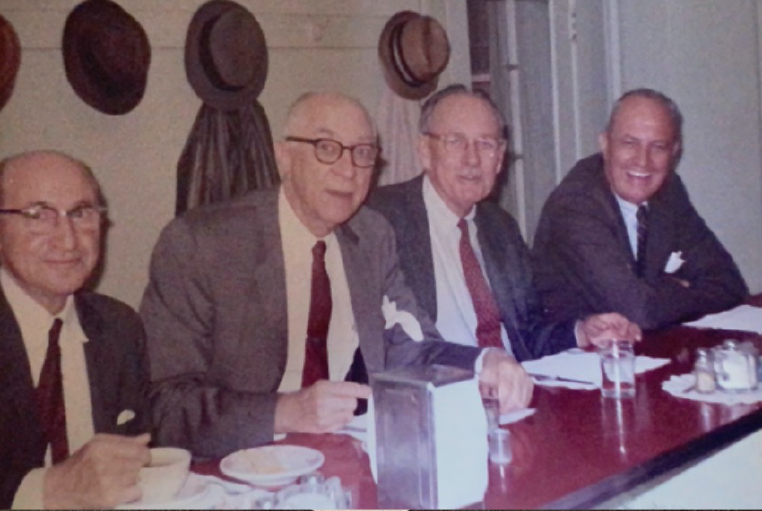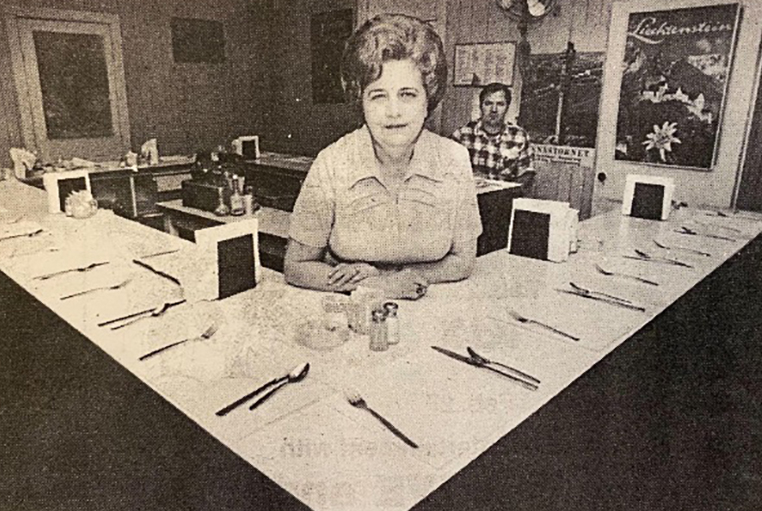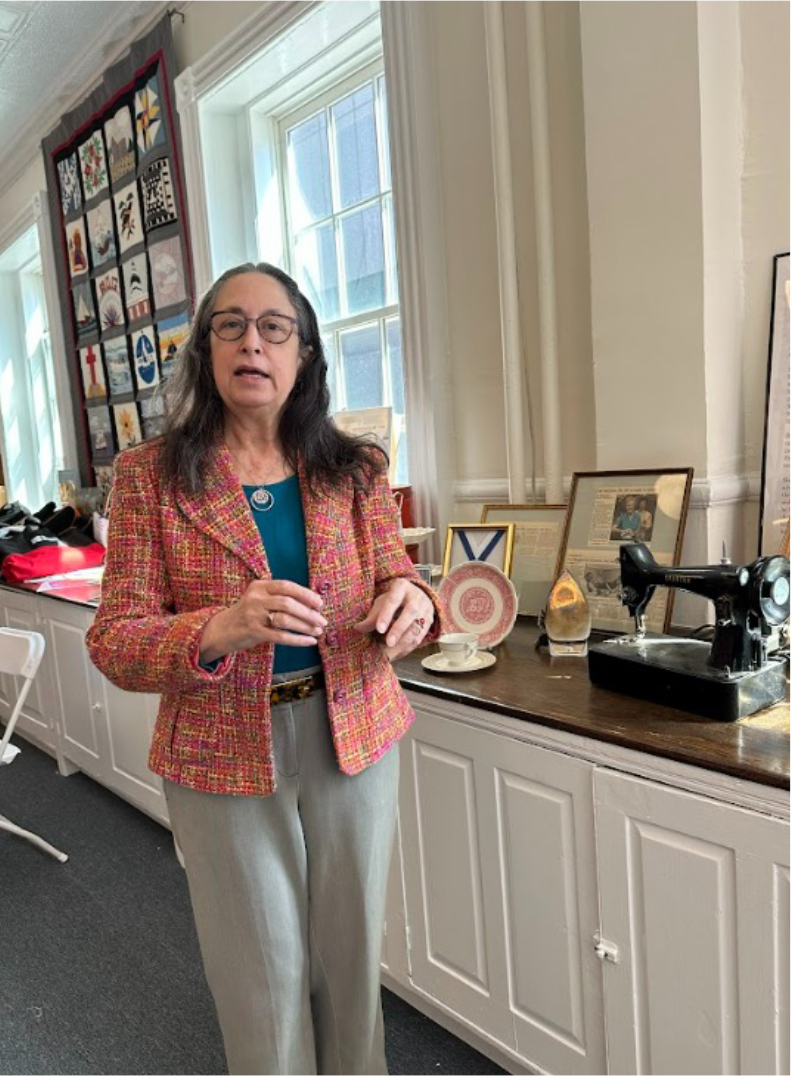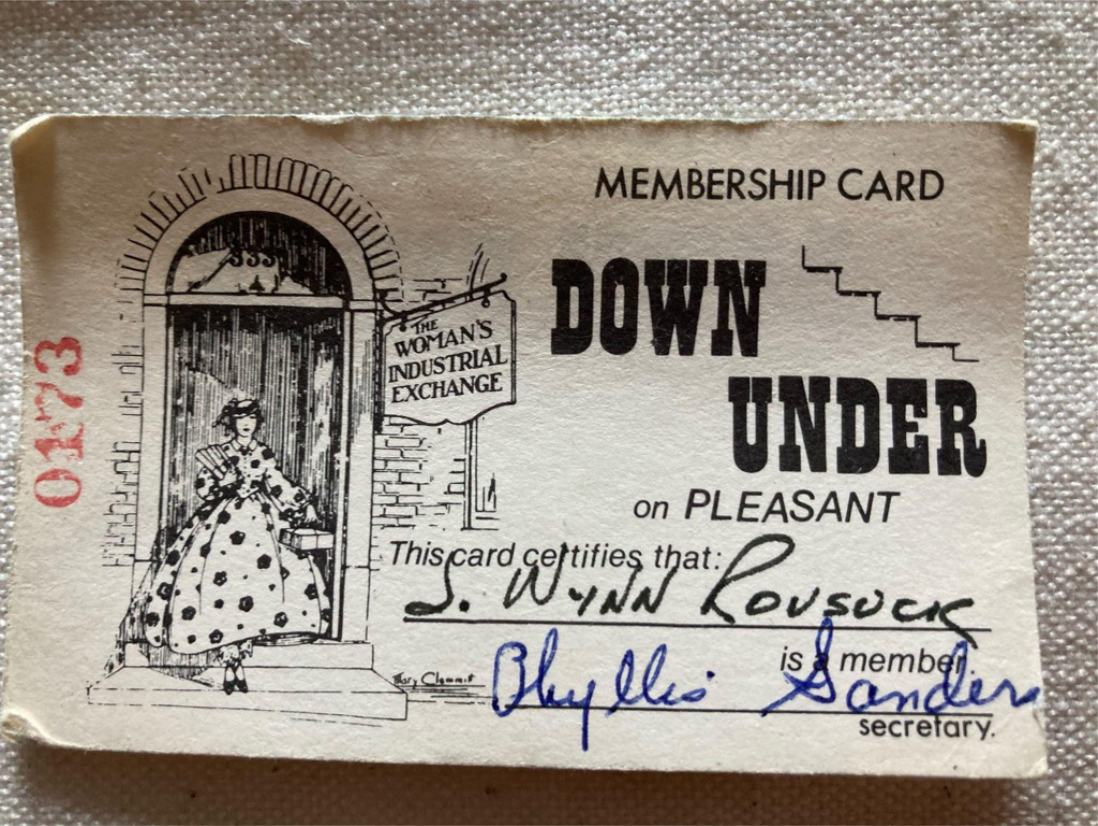Down Under Club
The kitchen, where Miss Dorthea worked, was in the basement along with a smaller dining area that served mostly male clientele. In this dining room, there was a counter that was run by the downstairs waitress, Phyllis Sanders. One customer, Mr. John Clabaugh Leitch, decided to found an unusual downtown Baltimore social organization on June 22nd, 1967. He decided that the lunch counter in the basement of the Exchange would be the perfect place for his club to meet and dine regularly. The club was named the Down Under Club. Club members would meet over lunch to discuss societal topics of interest.
Source:
“John Clabaugh Leitch, 91, Traveling Brush Salesman.” Baltimore Sun, May 24, 1999.

Down Under Members- Mr. Tissabaum, Mr. Mohr, Mr. Fuller, and Mr. Levy (1965), WIE Archives

Miss Phyllis Sanders (Unknown Date), WIE Archives
Members of the Down Under Club
“Where, after a wait, you may enjoy good food, good friends, conversation, and perhaps, learn something new every day.”
(Quote from the back of the Down Under Club membership card)
Most members were male and many were Baltimore lawyers, however, three female members have been discovered;
- Judith Rousuck
- Anne K. VonSchwerdtner
- Amy Lebo
VonSchwerdtner was interviewed when Mr. Leitch passed away. She stated that “he was indefatigable. The club he founded was like a drugstore counter, we got to know each other and develop friendships” (The Baltimore Sun, May 24, 1999).
Mr. Leitch’s usual lunch at the Exchange consisted of a cup of soup, half a ham sandwich, coffee, and ice cream. He rarely complained about the food or prices, and the Exchange workers “loved his stories. He was what the Exchange [was] all about” (Diane Coleman, The Baltimore Sun, May 24, 1999).
The Down Under Club began as a male-only counter, and continued to comprise mostly of men, until the closing of the Exchange. Judith Rousuck shared her memories of the Exchange and the Down Under Club in an interview conducted by researcher Amy Rosenkrans. She described the clientele of the second dining area as “an older group of gentlemen, but some really prominent Baltimoreans ate down there. Paul Patterson, who was then the publisher of the Baltimore Sun, ate there. Harrison Winter, who was a federal judge, ate there.” When asked why she though the club chose to eat at the Exchange, Rousuck answered that it “was an old Baltimore place and they were old-style Baltimore gentlemen.” She further described the Exchange community and Down Under Club as a wonderful resource since “there were enough people there in enough fields that they could get almost anything done. I remember even asking Judge Winter if he would perform my wedding ceremony. That would be my first place of reference when I was looking for any kind of recommendation.”
Layne Bosserman, an Exhange waitresss, served a few of the Down Under Club members near the closing of the Exchange. She recalled how former Senator Julian ‘Jack’ Lapides and a few other Down Under members even wrote her a letter of recommendation for a job at the Enoch Pratt Library. Rousuck recalls how the Down Under Club attempted to stay alive after the Exchange’s lunchroom closed, but over time members dwindled away.
VonSchwerdtner organized the lunches at other local restaurants but the club ultimately found its demise when she passed away. Rousuck describes VonSchewrdtner as a good friend and recalls taking her to numerous plays.
The third female member, Amy Lebo, was known to have made needlepoint covers for some of the seats in the basement of the Exchange where the Down Under Club met. Rousuck concluded her memories with the token that “the whole philosophy of the shop carried over into the Down Under counter. That real sense of welcoming and comradery and also sort of helping each other out.”
Judith Rousuck
Judith Rousuck’s career was being a theater critic for the Baltimore Sun for over twenty years. She was a regular customer at the Exchange, but would dine downstairs at the counter where she could enjoy a more peaceful meal away from the bustle of the upstairs lunchroom, starting around 1978 or 79 and stopped going in 2007, after the lunch bar was under different management. When she traveled to Michigan after receiving a government fellowship from the University of Michigan, she stayed in touch with the Down Under gentlemen. She was officially made a member of the informally named Down Under Club when some Baltimore gentlemen were passing around one of her articles at the counter, and then allowed to sit at the other side of the counter, where she ate every Wednesday (and most weekdays) as she would attend matinee shows at the Mechanic Theatre on those days. The Exchange was conveniently located halfway between the Theatre and the Baltimore Sun headquarters, so Judith would enjoy lunch on her way down to a 2 o’clock show, and not have to worry about fellow members asking about her her writing or opinions on certain plays. Rather, working men and women like Judith came to the Exchange for a break from work and related topics. Judith enjoyed the Exchange so much that she would bring visiting family to lunch, including her father, from Cleveland, Ohio, who had his own membership card.
Judith remembered the daily variations of the lunch menu. Mondays would be pot pies, and members of the Down Under Club also enjoyed kidney pie and gingerbread with sauce for dessert. Many actors and actresses performing in plays at the Mechanic Theatre and possibly the Ford’s Theatre would be staying in local hotels and go down to the Exchange for breakfast, like Jessica Tandy, whose name was written in the guest book. People like Judith and other members of the Down Under Club attended the Exchange for decades, partly out of a convenient location close to their workplace and efficient service, and partly because of the comfort provided by the familiar meals and people.
Judith, like many others, also enjoyed the wide variety of options from the consignment shop. She bought baby gifts, specifically hand smocked dresses. She bought a few things for herself, including a tile with a painting of the Exchange on it. Being a dessert lover, she also purchased a sign that read “life is short, eat dessert first,” which is reminiscent of the Exchange’s devil’s food cake with white icing that she often ordered (even if she had not eaten lunch yet, since she was on a tight schedule).
Judith remembered the Exchange fondly, especially as someone who grew up outside of Maryland. To her, the Exchange was a representation of “civility,” a place where everyone was respectful, inclusive, and fostered a community of camaraderie where everyone knew each other’s names, a sense of familiarity that she misses today.

Judith Rousuck (2022), WIE Archives

Judith Rousuck’s “Down Under Club” Membership Card, Picture courtesy of Ms. Rousuck
“I was here a lot of days. It was just a wonderful break for me.”
“As far as I know, the Down Under was begun by a man named Clay Leitch. He’s crucial to this story. Very gregarious guy. He, I believe, was a paintbrush salesman…and a really accomplished photographer. He was a world traveler. I remember his wife was a retired professional figure skater. The travel pictures he took were sold professionally and a lot of them as posters hung on the walls of the Down Under.”
“Nelson Coleman jewelers was in the same building, in the basement, on the entrance of Pleasant Street. One afternoon I got there for lunch, and everyone was quite excited because someone had robbed the jewelers and they had escaped running through the Down Under. And I think they might have dropped the jewelry, I’m not sure.”
“So, the fact that women edged our way in there is significant. By the time that happened, roles for women had changed dramatically, but if more women had wanted to eat down there, I’m sure they would have been welcome. And you occasionally got some tourists eating down there, too. I’m sure they got a kick out of it.”
Source:
“John Clabaugh Leitch, 91, Traveling Brush Salesman.” Baltimore Sun, May 24, 1999.
“Interview with Judith Rousuck.” Amy Rosenkrans, 2023.
